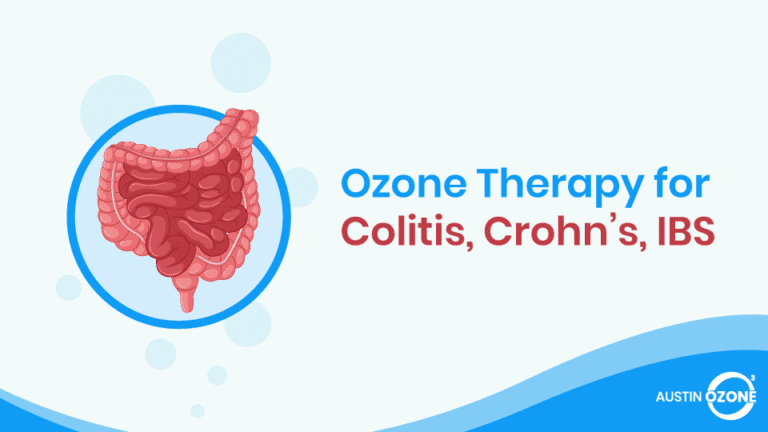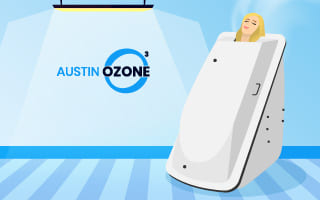Colitis, Crohn’s, and Irritable Bowel Syndrome (IBS) are common bowel disorders affecting the gastrointestinal tract. They have similar symptoms; their differences lie in their location and cause.
Once diagnosed properly, patients can go through the appropriate treatment for them.
Overview of Colitis, Crohn's and IBS
Colitis, Crohn’s, and IBS involve the bowel movement, which refers to the final process where the food goes through the gastrointestinal tract.
When food is eaten, the digestive system absorbs the nutrients it can from it, leaving only waste in the form of feces. This waste passes through the rectum and anus for removal.
An abnormality in the bowel movement shows that there is a problem with your small and large intestines. Patients with a bowel disorder are highly uncomfortable.
If you suspect a bowel disorder, you need to consult your doctor to know the exact cause and to get the correct treatment plan.
Schedule a Steam Ozone Sauna Session Today
Common Bowel Disorders
Bowel disorders1 are usually triggered by various illnesses or abnormalities in the gastrointestinal tract. Here are the three most common bowel disorders:
Colitis
Colitis is the inflammation of the colon’s inner lining, mainly due to infection. The colon is a long, hollow tube where the waste products from digested food goes. It is composed of many layers of tissue that work together to squeeze out the liquid from the waste and form a solid stool.
An individual can acquire colitis in various ways. One is by eating or drinking contaminated food or beverage. The common bacteria that cause colitis include Shigella, Campylobacter, Salmonella, E. coli, and Yersinia.
Another is by taking antibiotics that cause the ‘good’ bacteria in your gut to die, in turn allowing the ‘bad’ bacteria to flourish. Patients can become susceptible to colitis if they suffer from low blood pressure or anemia.
An individual can acquire colitis in various ways. One is by eating or drinking contaminated food or beverage. The common bacteria that cause colitis include Shigella, Campylobacter, Salmonella, E. coli, and Yersinia.
Most forms of colitis share these general symptoms1: aches and pains especially in the abdomen area, loss of appetite, fatigue, fever, diarrhea, and mucus or blood in the stool. Other symptoms include indigestion, cramping, bowel urgency, and heartburn.
Colitis is usually diagnosed by looking at an x-ray image of the colon and testing for blood and pus from stool samples.
The treatment plan depends on the type of colitis you have. Medications are sometimes prescribed if your colitis is caused by an infection. Some doctors will also recommend a diet change to prevent triggering the disease.
Crohn’s Disease
Crohn’s disease1 is an inflammatory bowel disease in the small intestine, although it can spread to any part of the gastrointestinal tract.
Nobody knows what causes Crohn’s disease. However, some research claims that it can be caused by a genetic condition, a malfunctioning immune system, or one’s current environment.
The symptoms associated with Crohn’s disease are diarrhea, constipation, blood in the stool, and weight loss. They develop gradually and worsen over time. As such, Crohn’s disease is often mistaken for other conditions like food poisoning or allergy.
The symptoms1 associated with Crohn’s disease are diarrhea, constipation, blood in the stool, and weight loss. They develop gradually and worsen over time. As such, Crohn’s disease is often mistaken for other conditions like food poisoning or allergy.
If left undiagnosed and untreated, Crohn’s disease can result in pain and drainage in the anus area, development of ulcers anywhere from the anus to the mouth, and inflammation of the skin and joints.
There is no single test to diagnose Crohn’s disease. The doctor will probably suggest blood tests, stool tests, and biopsy, along with an endoscopy and a colonoscopy to determine your bowel disorder. CT and MRI scans can also give your doctor more details about your condition.
There is no cure for Crohn’s disease, but there are plenty of treatment options that can help you manage the symptoms. Medications like anti-inflammatory drugs, antibiotics, and immunomodulators are often prescribed to reduce the body’s inflammatory response.
For more advanced stages of the disease, you will need to undergo surgery to remove the damaged portions of your gastrointestinal tract
Irritable Bowel Syndrome (IBS)
Known as irritable colon or spastic colon, IBS3 is a collective term for a group of intestinal problems that normally occur together. Women tend to be more affected by IBS, especially during their menstrual period. However, this does not mean that IBS does not develop in men.
The exact cause of IBS is unknown, but it has been linked to stress and to oversensitive nerves in the gut.
The typical symptoms of IBS include abdominal pain, bloating and gas, cramping, constipation, and diarrhea.
The severity of the symptoms and their duration may vary from person to person. The typical symptoms3 of IBS include abdominal pain, bloating and gas, cramping, constipation, and diarrhea.
Similarly to Crohn’s, there is no exact test to diagnose IBS. Doctors usually conduct tests that check for other bowel disorders to eliminate them from the list of possibilities.
IBS is usually a lifelong disorder with no cure. If your doctor suspects IBS, they are most likely to suggest a lifestyle and diet change to manage your condition.
You should avoid foods and beverages that are caffeinated, alcoholic, and spicy, as they can trigger IBS. You can also take probiotic supplements and exercise. In addition, some patients try taking over-the-counter medications to help relieve the symptoms.
Known Risk Factors for Bowel Disorders
The precise cause of most bowel disorders is unknown. However, most experts claim that there are several risk factors that can increase the chances of developing one. For example, Crohn’s disease can be genetic.
Immunologic and microbial factors should also be considered. Weak immune systems are prone to infections while those with a microbial imbalance (i.e., more ‘bad’ bacteria than ‘good’) will also suffer from poor bowel movement.
Moreover, if you have intestinal obstructions caused by a previous surgery or injury, you are likely to develop a bowel disorder.
Lastly, environmental factors like having a poor diet, smoking cigarettes, and drinking alcohol can trigger a bowel disorder. You need to work with your doctor to determine the types of food that can aggravate your condition.
Top 3 Natural Treatments for Bowel Disorders
Most bowel disorders do not have a cure. The most a doctor can do is prescribe medications that can relieve some of the symptoms. For this reason, many people are looking at alternative and complementary medicine for a possible cure.
While many of these procedures are still not approved by the U.S. Food and Drug Administration, these treatment plans are considered effective by those who have tried them.
Probiotics and Herbal Supplements
Probiotics are live ‘good’ bacteria that can rebuild the balance in your gut. Aside from helping your digestive system work properly, probiotics also help in preventing the infections caused by the ‘bad’ bacteria.
In addition to probiotics, many people believe that taking other supplements like fish oil and certain herbs (i.e., aloe vera) can help reduce the symptoms of bowel disorders.
Acupuncture
Sticking thin needles into different parts of your body sounds highly dangerous, but those who promote Chinese traditional medicine swear by the effectiveness of this procedure.
Patients who have tried acupuncture report experiencing less diarrhea, stomach pain, and inflammation.
Ozone Therapy for Colitis, Crohn's, IBS
Ozone therapy for Colitis involves the administration of medical ozone gas to the body through various methods.
According to studies conducted on the subject, it is a powerful disinfectant that can eliminate the source of infection, heal wounds, and strengthen the immune system. Thus, ozone therapy for colitis, ozone therapy for crohn’s and ozone therapy for IBS are considered to be a promising solution and this therapy is also useful for gut-related concerns.
While there are different approaches to introducing ozone into the body, rectal insufflation seems to be the best method for treating bowel disorders.
While there are different approaches to introducing ozone into the body, rectal insufflation4 seems to be the best method for treating bowel disorders.
With this method, a specific concentration of medical ozone gas is directly introduced into your body through the rectum.
Once in the rectum, the ozone is directly absorbed by the bloodstream near the intestines. It is said that medical ozone2 can improve the ‘good’ bacteria in the intestines.
Since ozone is administered directly through the rectum, you might experience a slight, temporary discomfort. The good news is that there are no reported adverse effects from those who experienced this type of treatment. It is natural, safe, non-toxic, and non-invasive – everything you can ask for from a treatment plan.
If you are thinking of trying an ozone therapy for colitis treatment, you should always remember to consult your doctor first.
Summary
Colitis, Crohn’s Disease, and IBS are disorders affecting the gastrointestinal tract. Although these conditions are common, effectively treating them using conventional methods can be tricky.
As such, more and more patients are seeking alternative ways to heal and reduce symptoms. With options like ozone therapy for Colitis, ozone therapy for Crohn’s, ozone therapy for IBS, patients can have an easier time managing and treating their disorders.
Schedule an Appointment Today
References
- Chavoustie, C. (2020, May 11). The difference between Crohn’s, UC, and IBD. Retrieved from https://www.healthline.com/health/crohns-disease/crohns-ibd-uc-difference
- Mallaeva, R. (2018). The influence of ozone therapy on the condition of intestinal microbiota. North-Caucasian Federal Research Clinical Center, 2(1).
- NHS. (2017, October 9). What is IBS? Retrieved from https://www.nhs.uk/conditions/irritable-bowel-syndrome-ibs/
- Rose’s Remedies. (n.d.). Now providing ozone therapy at Rose’s Remedies. Retrieved from http://rosesremedies.com/services/ozone-therapy/






